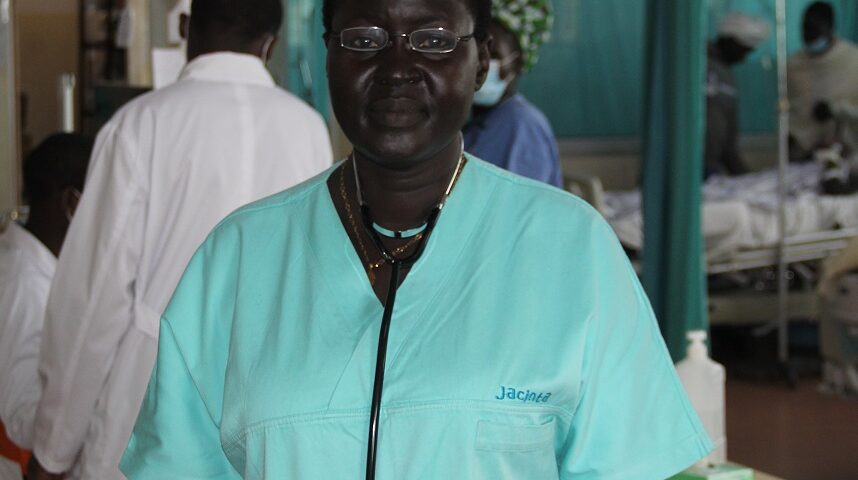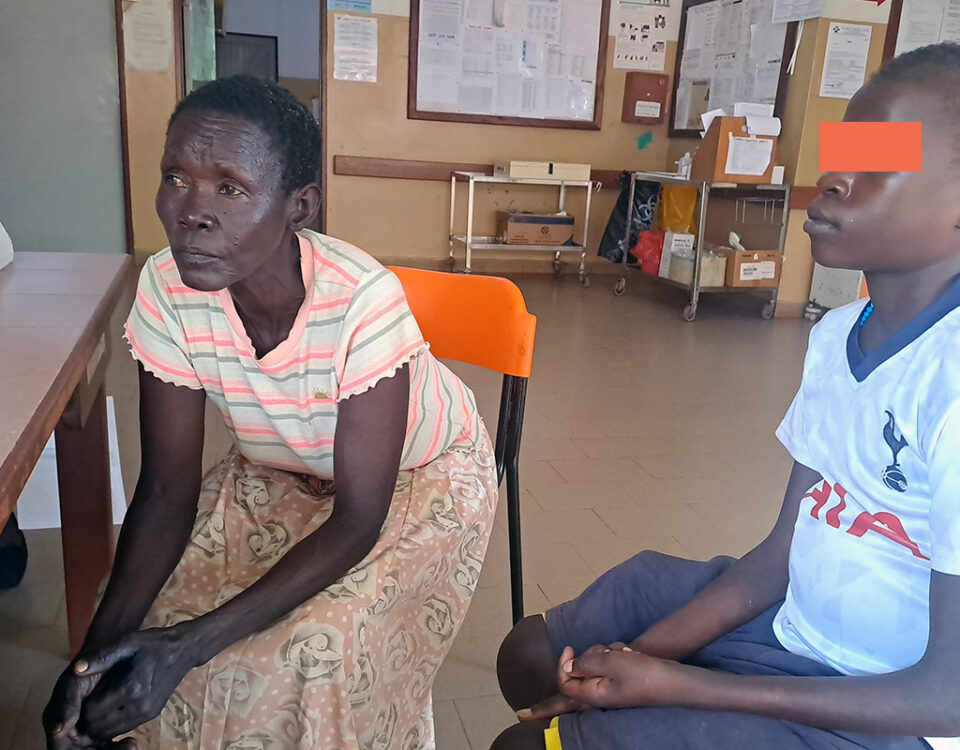They say what is meant to be will be no matter how hard you try to prevent it or run away from it. Perhaps this is a Biblical allusion taken from the Book of Jonah but this saying is also true for Jacinta Amito, a senior anaesthetist and tutor who tried everything to avoid the calling to embrace anaesthesia.
Born and raised in Kalongo in northern Uganda, the 55-year-old spent most of her childhood with her father in Adilang village where he was teaching. Jacinta had no passion for the medical profession. This she attributes to her fear of the needle. “I was not someone that is really focused on anything at all. And the medical field was one of the things I thought I would not even stay in because I didn’t have the courage. And I fear needle pricks, and I didn’t know that I would be part of it,” she says.
Back in the 80s during the war, the career options were really few for a school-going child. And for Jacinta, after finishing her senior four education, she was met with this harsh reality. At that time a team of medical professionals came to conduct interviews for midwifery. This would open the door to her long and industrious career in medicine. Immediately after she finished, she was taken to work in the theatre where she was trained on the job in anaesthesia.
“Cowardly as I was, I fainted the first day I entered the theatre,” Jacinta recalls her early days in the profession. “Sister Romilde told me that ‘you’re going to be one of the best nurses and we are going to train you to work in our theatre’”. She would then go through the skilful hands of Sister Romilde and her tutor Catherine who would take her to school and use models to make her understand the basics of anaesthesia and how to intubate.
Embracing Anesthesia
When Jacinta arrived at Lacor Hospital in 1997, Dr Piero Corti, the Hospital Director at the time, aware of her knowledge in anaesthesia, gave her two options; either to go to Italy and study intensive care or to have an office and be a supervisor, because she was new and people didn’t know her much. “I turned down both requests. I said, I’d never been in an administrative post before and I don’t think I would ever make it in intensive care. It was something that I did not even dream about,” she recalls.
Jacinta chose to be given a period of one year to think over the offer. After the one year, with encouragement from her father, she came back and joined a formal training in anaesthesia. She completed her training in 2001 from Mulago School of Anesthesia and then came back to work at Lacor Hospital.
The Mentorship
Upon her arrival at Lacor Hospital, she worked closely with Dr Towey Raymond who was her supervisor in theatre at the time and also mentored her to work in the ICU. Dr Raymond would later arrange for her to go to Gloucestershire Royal Hospital in England for a month to improve her experience in ICU.
In 2009, Dr Bruno Corrado, the hospital Administrator arranged for her to go to Italy for one month also to gain exposure and experience in ICU. These trips proved to be very valuable as she would later introduce the new methods of work she learned from abroad at Lacor Hospital as well as co-author two books on anesthesiology with Dr Raymond.
Another prominent person in her career is Dr Henry Bukirwa. A senior anesthesiologist, Dr Henry taught Jacinta at Mulago School of Anesthesia and also helped establish a Satelite training center for anaesthesia at Lacor Hospital that Jacinta now oversees.
He has since retired but still continues to occasionally visit the hospital to offer support to Jacinta and mentor students in anaesthesia.
Becoming a Tutor
At Lacor Hospital, she found a gap in anaesthesia so she had to train people to work alongside herself. Because teaching and training became part of her anaesthetic work, she fully enrolled to be a formal teacher at Mulago Tutors College in Kampala. Clinical teaching has since become one of the things she loves the most; working and training somebody alongside to do what she does, and “then I observe and see the success they’ve come with,” she says.
Encouraged and inspired by her tutor Sr. Machetti Catherine, who encouraged her to teach, Jacinta has since trained over 70 anaesthetists through formal education and more than 20 trained-on-job since 2011 from Uganda, South Sudan and Ethiopia. Very few people choose to study anaesthesia every year but Jacinta is impressed nonetheless with how far the practice has come.
Looking back, Jacinta only has good memories to smile upon. “The students were passing 100% in the beginning. Those are the best moments of my time; they were passing and then they’re all employed, and I get feedback that they’re doing well. And the tutors which I have now, are the tutors which I trained informally, then they went through the training and now they are qualified tutors out of the informally trained staff that I had.”
Winning the award for the best tutor

Jacinta (C) posing with her award with the Medical Director, Dr Emintone Odongo (L) and the Executive Director, Dr Cyprian Opira (R)
It is impossible for performances such as those of Jacinta to go unnoticed. In 2016, she started working with the examination board, setting exams, moderating exams and also occasionally being appointed as an invigilator.
In 2018, she was promoted to coordinator; coordinating exams and overseeing the center for examinations until now. In April this year, the Uganda Allied Health Examination Board decided to vote on the best tutor in anaesthesia. In absentia, Jacinta was voted for by her peers as the best tutor in anaesthesia for the good job done.
She was officially recognised by the Ministry of Education and Sports on 30th April 2022 when the honourable minister Janet Kataaha Museveni handed her the award. “And I was very grateful for that,” she recalls.
The challenges
There are quite a number of challenges; working in intensive care is very unpleasant because there’s a very high death rate compared to the good outcome that one gets. But for Jacinta, “the few survivors give you happiness, you feel happy because they really come out from very tough times.”
Working in intensive care is quite demanding and yet she has to combine this with tutoring. “I feel that I could not be in two places at the same time. I leave students in class and I come and save patients. Or sometimes I come together with them,” says Jacinta who has watched the hospital grow and the number of patients requiring intensive care increase over the years.
According to Jacinta, the patients who come to Lacor are quite difficult patients because they have moved all over the places and they come in at the last moment when their first point of contact with a health facility has failed. So they really need critical, special care and attention given to them.
Wars, epidemics and poverty have not made the journey of Lacor Hospital an easy one. But the hospital has remained grounded on the principle of offering the best possible care to the greatest number of people at the lowest cost. That has provided a firm foundation for many like Jacinta to thrive.
At the height of the Lord’s Resistance Army (LRA) war waged on the civilians and government of Uganda by Joseph Kony, Jacinta was ever present and spent most of her days and nights in the operation room and working without annual leave.
“Helicopters would come and land near the hospital and casualties are brought in,” she says. “We would sort them in the corridors and then take those ones who need to be taken immediately to theatre and then continue resuscitations in the theatre corridor while giving anaesthesia to those who require it.”
When the deadly Ebola virus struck in the year 2000, Jacinta was in Kampala but she kept coordinating with her colleagues on the ground as the battle rages on. The coronavirus pandemic placed a huge burden on the hospital. The cost of running the hospital went up to the roof as most of the surrounding health facilities are ill-equipped to handle severe cases of Covid-19. This left the hospital’s Covid-19 unit operating beyond full capacity, placing Jacinta and her colleagues in the ICU under immense pressure.
Best moments
For Jacinta, being an anaesthetist “takes a lot of sacrifices, but it is also rewarding because you touch really the life of the person. And what you do as an anaesthetist no money in this world can pay.”
She gains joy whenever a patient walks out of the intensive care alive. “Quite a number of my colleagues and many people thought I was being paid a lot of money but my payment is what I see happening and I am very grateful for that.” She concluded
The School of Anaesthesia at Lacor Hospital is a Government school belonging to the Uganda Institutes of Allied Health and Management Sciences, Mulago Kampala.


